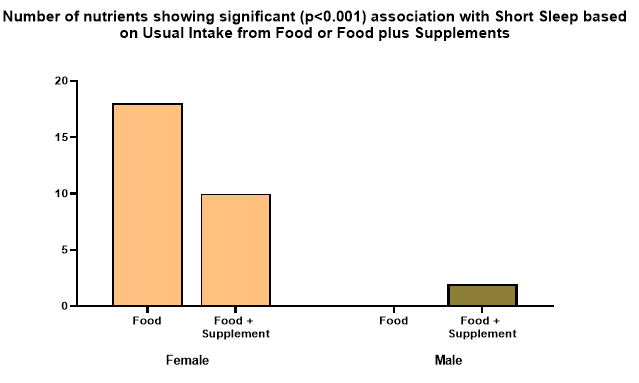
Recent research suggests that those who do not consume the recommended amounts of vitamins and minerals may be more likely to have issues sleeping. Specifically, those who consumed lower amounts of vitamins A, D, and B1 as well as magnesium, niacin, calcium, zinc and phosphorus were more likely to get less than the recommended amount of sleep each night. The findings of this study were presented at Nutrition 2019, the American Society for Nutrition’s annual meeting held in the Baltimore Convention Center from June 8-11.
The researchers found that those who got less than seven hours of sleep per night (the amount recommended for adults by the Centers for Disease Control and Prevention) were more likely to have consumed lower amounts of the vitamins and minerals mentioned above than those who got over seven hours of sleep per night.
This work also found that more nutrients were associated with low-quality sleep in women than in men. This discrepancy decreased if women took dietary supplements, providing evidence that supplementation can be successful in boosting nutrition where diet falls short. The figure below portrays this association between sex and nutrients linked to sleep.

“This work adds to the body of growing evidence associating specific nutrient intakes with sleep outcomes,” said the study’s lead author Chioma Ikonte, director of nutrition science at Pharmavite, LLC. “Our findings suggest that individuals with short sleep duration might benefit from improving their intake of these nutrients through diet and supplementation.”
These findings have implications not only for nutrition’s role in sleep duration, but in sleep disorders, quality, and in the act of falling asleep as well. Many of these nutrients emphasized in the study are micronutrients, which are only needed in trace quantities but must be obtained through diet. There are billions of individuals internationally that suffer from micronutrient deficiency, and these findings indicate that they may be more likely to experience sleep disorders.
Other work has found micronutrients to be essential for growth and development, immune system function, and other bodily functions like sleep. For example, the melatonin compound that helps one fall asleep is derived from magnesium, a micronutrient. Some research suggests that zinc factors into sleep regulation as well, however, this work was a retrospective analysis rather than a controlled study. Though it shows a trend, it cannot be viewed as cause and effect.
“Whether chronic short sleep causes nutrient insufficiency or the nutrient insufficiency causes short sleep still needs to be determined,” said Ikonte, who presented these findings at Nutrition 2019. “A clinical study that investigates [impacts of] supplementation with these nutrients on sleep outcomes is needed to demonstrate cause and effect.”
Data for this research was generated from the National Health and Nutrition Examination Survey (NHANES), a large sample of U.S. adults that represents the general population.
About Pharmavite, LLC
Pharmavite is a company specializing in dietary supplements. Founded by Barry Pressman in 1971, the company was later acquired by Otsuka Pharmaceutical in 1989 and has since received several “Vendor of the Year” awards. It’s Nature Made vitamin line was launched the following year, and has become one of the most popularized supplement brands in the U.S..







 © 2025 Mashup Media, LLC, a Formedics Property. All Rights Reserved.
© 2025 Mashup Media, LLC, a Formedics Property. All Rights Reserved.